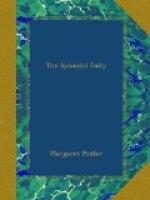Presently the darkness cleared away and she found that she was still singing—mechanically her voice had answered to the long training of years. But the audience had heard the great prima donna catch her breath and falter in her song. For an instant it had seemed almost as though she might break down. Then the tension passed, and the lovely voice, upborne by a limitless technique, had floated out again, golden and perfect as before.
It was only the habit of surpassing art which had enabled Diana to finish her song. Since last night, when she had seen Max for that brief moment at the Embassy, she had passed through the whole gamut of emotion, glimpsed the vision of coming happiness, only to believe that with her own hands she had pushed it aside. And now she was conscious of nothing but that Max—Max, the man she loved—was here, close to her once again, and that her heart was crying out for him. He was hers, her mate out of the whole world, and in a sudden blinding flash of self-revelation, she recognised in her refusal to return to him a sheer denial of the divine altruism of love.
The blank, bewildering chaos of the last twelve hours, with its turmoil of conflicting passions, took on a new aspect, and all at once that which had been dark was become light.
From the moment she had learned the truth about her husband, her thoughts had centred solely round herself, dwelling—in, all humility, it is true—but still dwelling none the less egotistically upon her personal failure, her own irreparable mistake, her self-wrought bankruptcy of all the faith and absolute belief a woman loves to give her lover. She had thrust these things before his happiness, whereas the stern and simple creed of love places the loved one first and everything else immeasurably second.
But now, in this quickened moment of revelation, Diana knew that she loved Max utterly and entirely, that his happiness was her supreme need, and that if she let him go from her again, life would be henceforth a poor, maimed thing, shorn of all meaning.
It no longer mattered that she had sinned against him, that she had nothing to bring, that she must go to him a beggar. The scales had fallen from her eyes, and she realised that in love there is no reckoning—no pitiful making-up of accounts. The pride that cannot take has no place there; where love is, giving and taking are one and indivisible.
Nothing mattered any longer—nothing except that Max was here—here, within reach of the great love in her heart that was stretching out its arms to him . . . calling him back.
The audience, ardently applauding her first song, saw her turn and give some brief instruction to her accompanist, who nodded, laying aside the song which she had just placed upon the music-desk. A little whisper ran through the assembly as people asked each other what song was about to be substituted for the one on the programme, and when the sad, appealing music of “The Haven of Memory,” stole out into the room, they smiled and nodded to one another, pleased that the great singer was giving them the song in which they loved best to hear her.




